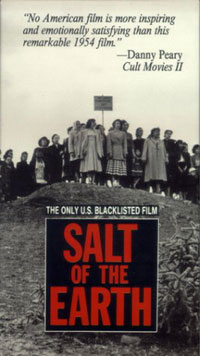Banned movie, speaker series addresses social justice issues
![salt_earth_poster Salt of the Earth movie poster]() Ryan Eldred
Ryan Eldred
The Signal Staff
Originally banned in the United States, the 1954 film “Salt of the Earth” will be shown March 13, at 7 p.m. in the SSCB Lecture Hall.
The film focuses on the miners’ strike against the Empire Zinc Mine in New Mexico, the prejudice against the Mexican-American workers, and the struggle of women, specifically the miners’ wives, for recognition, dignity and equality. Guest speakers include Frances Kavenik, emeritus professor of English, Angela Howard, professor of history, and Adam Hodges, associate professor of history.
“We wanted to show this particular film for two reasons,” Howard said. “The first is to acknowledge women’s study week and the second is because several student groups wanted to show a film that implies social justice.”
The miners’ strike had three main goals. They wanted the same treatment as the Anglo workers including their health and safety standards and their equality in compensation.
“Many women including mothers, daughters and sisters put themselves on the frontline of the strike for a year and a half for these men who were treated so harshly,” Howard said.
This film was written, directed and produced by members of the original “Hollywood Ten,” who were blacklisted for refusing to answer Congressional inquiries on First Amendment grounds. In 1947, a group of 50 motion picture executives created a “black list” of suspicious people who would not be able to obtain a job in the film industry. Ten of the black listed executives joined together to create an independent film company. This allowed them to have a job and continue with the production of various films. In turn, they produced “Salt of the Earth.”
Because the miners were mistreated in multiple ways, the mine owners objected the film’s release. If the film were release then they could have the possibility of having to increase wages and also health and safety standards. However, the owners had emphasis within the government that the workers lacked, therefore making it a matter of “power by politics”. McCarthy’s House Un-American Activities Committee resented that the film was ever introduced and aimed to deter the production of such a film that depicted how these miners were underpaid, overworked and treated below the normal standards.
Many people involved in the production of this film were immediately targeted by the HUAC. Some even suffered violent attacks such as the main actress, a Hispanic woman, who was arrested and deported in an attempt to silence the film said Kavenik.
“Salt of the Earth” is not only important historically, but artistically as well,” Kavenik said.



Comments are closed, but trackbacks and pingbacks are open.